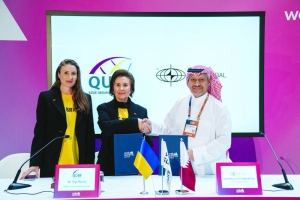Fanar leads Arabic AI innovation, bridging culture and technology

Doha, Qatar: Qatar is revolutionising the technological landscape by driving growth, innovation, and empowerment across multiple sectors. By constantly innovating and embracing new technologies, the country is achieving the vision set out in the Digital Agenda 2030.
Fanar, the Arab Artificial Intelligence Project, bridges Arabic language and culture with the latest advancements in AI, aligning with Qatar National Vision 2030 and the objectives of the Digital Agenda 2030, Ministry of Communications and Information Technology stated on its social media handle, recently.
Highlighting about the several features that distinguish this project, the post noted that Fanar is culturally and religiously aware as it incorporates an understanding of the nuances of Arab cultures and Islamic values. It is fluent and understands a wide range of Arabic dialects; integrates voice-based interaction that enables natural conversations.
The post added, it enables fact-checking and finds sources for information, provides citations for accuracy and is polite and ethical, always respectful, tolerant, grounded in strong ethical principles and constantly improving.
Built on a robust linguistic framework and powered by advanced algorithms, Fanar excels in Arabic-centric thinking, understanding nuanced meanings, and capturing subtle linguistic distinctions.
These features make it an ideal tool for overcoming linguistic and cultural barriers, fostering effective communication, and promoting knowledge exchange. Its extensive capabilities include text and multimodal data generation, content creation, translation, and knowledge fact-checking.
It is a groundbreaking model developed to achieve an in-depth understanding of Arabic in all its dimensions, encompassing diverse dialects and cultural expressions. It is built on an extensive database of more than 300 billion words and over a trillion Arabic phonetic segments, enabling creative ability to generate, write, summarize, rephrase, or explain texts with exceptional efficiency. With an advanced technical architecture comprising seven billion parameters, it ensures flexible and rapid data processing.
The project is developed by QCRI at Hamad Bin Khalifa University with full support from the Ministry of Communications and Information Technology in the forms of financial and organisational assistance. Partners support Fanar in various ways ranging from providing high-quality data, end-user testing, evaluation and benchmarking, and adoption in use cases.
The role of the Digital Agenda 2030 in driving Qatar towards becoming a global technological hub adopting the latest digital technologies, including 5G networks, AI, digital twin, cloud computing and big data towards the realisation of the objectives of Qatar National Vision 2030 and the National Development Strategy to develop knowledge-based digital economy that is both diverse and competitive, supports the private sectors, and depends on innovation and entrepreneurship.
The Digital Agenda enhances the effectiveness of the digital economy and society and accelerates the pace of economic transformation and competitive efficiency. This is achieved through the adoption of innovative digital strategies that prioritise inclusivity and foster sustainable prosperity in the digital era.
Related
QUBF launches ‘Qatar-Ukraine Tech and Innovation Committee’
Dr Olga Revina, chairperson of QUBF, and Sheikh Mansoor bin Khalifa al-Thani, fou
Initiative to support digital innovation in Qatar launched
Assistant Undersecretary for Digital Industry Affairs at MCIT Reem Al Mansoori, and General Manager of Microsoft Qatar Lana Khalaf exchanging documents after s
MCIT, Microsoft Sign Partnership Initiative to Support Digital Innovation and…
As part of its efforts to enhance digital innovation and support the growth of startups in the country, the Ministry of Communications and Information Technolog
IIA Qatar hosts session on tech-driven transformation in internal audit
Officials pose during the seminar hosted by Institute of Internal Auditor Qatar Chapter. Doha, Qatar: The Institute of Internal Auditor Qatar Chapter r












